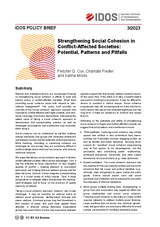Policy Brief
Strengthening social cohesion in conflict-affected societies: potential, patterns and pitfalls
Cox, Fletcher D. / Charlotte Fiedler / Karina MrossPolicy Brief (3/2023)
Bonn: German Institute of Development and Sustainability (IDOS)
DOI: https://doi.org/10.23661/ipb3.2023
Online appendix IDOS Policy Brief 3/2023
Bilateral and multilateral donors are increasingly focusing on strengthening social cohesion in efforts to build and sustain peace in conflict-affected societies. What does promoting social cohesion mean with respect to international engagement? This policy brief provides an overview of the “social cohesion” approach, explains how it applies to conflict-affected and fragile contexts, and introduces a typology of common interventions. It discusses the added value of taking a social cohesion approach to development and peacebuilding practice, as well as challenges policymakers and practitioners may encounter when using it.
Social cohesion can be understood as positive relations among individuals and groups (the horizontal dimension) and between society and the state (the vertical dimension). While fostering, rebuilding or sustaining cohesion are challenges for any society, they are particularly difficult in conflict settings where divisions fuel violence and violence reinforces divisions.
We argue that taking a social cohesion approach in divided, conflict-affected societies offers several advantages. First, it has the potential to focus intervention on less tangible aspects of conflict – drawing attention to overlooked grievances and bringing tensions between groups and the state into focus. Second, it helps integrate a peacebuilding lens in a broad variety of policy spaces. Third, it helps policymakers to integrate citizen perspectives into development strategies and to focus on the provision of quality peace for all citizens.
Taking a social cohesion approach, however, also brings challenges. It may be sensitive for external actors to address social grievances, identity-based divisions and power relations. Dominant groups may feel threatened in their position of power and push back against these attempts, or tensions among historically marginalised groups may cause friction. Donors may experience backlash against programmes that directly address sensitive topics. At the same time, if the intent is to take a transformative approach to building social cohesion, it may be difficult for donors to maintain a neutral stance. Social cohesion programmes may risk increasing tension in the short term, but to restore inter-group trust and state legitimacy over the long term, it might be necessary to confront and accept tension.
Reflecting on the potentials and pitfalls of strengthening social cohesion in fragile and conflict-affected contexts, we suggest that policymakers and practitioners should:
- Think politically. Fostering social cohesion may initially appear less political or less contentious than peacebuilding, but it inevitably involves engaging politics, as well as identity and power dynamics. Securing donor support for “apolitical” social cohesion programming may at first appear to be advantageous, but this perception risks overlooking power relationships, politicised grievances, hierarchies and other salient dimensions of social structure (e.g., class dynamics).
- Expect pushback. The social cohesion approach has the potential to interrupt powerful political and economic structures that link social and political identities (e.g., ethnicity, class and gender) to power, status and public goods. Donors should expect overt and covert pushback and contention and be prepared to encounter the stickiness of informal institutions
- Work across multiple dividing lines. Strengthening in-group trust and cooperation may negatively affect out-group relationships and overall social cohesion. Fostering social cohesion in the wake of violent conflict requires networks to address multiple social divisions. Large coalitions that cut across race, ethnicity, gender, class and generation are notoriously difficult to form and sustain, yet essential for building sustainable peace.
Contact
Cornelia Hornschild
Publication Coordinator
E-mail Cornelia.Hornschild@idos-research.de
Phone +49 (0)228 94927-135
Fax +49 (0)228 94927-130
Alexandra Fante
Librarian/ Open Access Coordinator
E-Mail Alexandra.Fante@idos-research.de
Telefon +49 (0)228 94927-321
Fax +49 (0)228 94927-130





![[Translate to English:] Photo: Alexandra Fante, Bibliothekarin/Open Access-Koordinatorin](/fileadmin/_processed_/f/0/csm__c_Deutsches-Institut-fuer-Entwicklungspolitik_Fante_94ce4fa1ba.jpg)